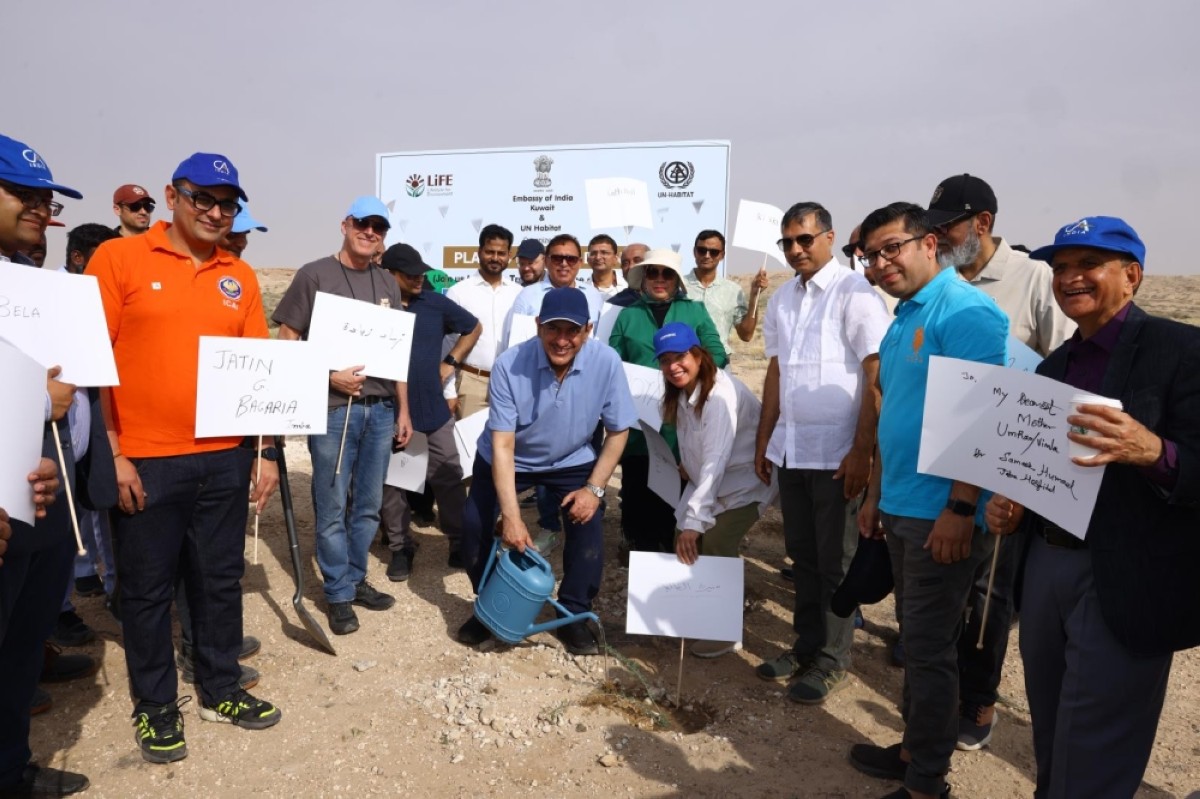KUWAIT: The Embassy of India to Kuwait, in association with the UN-Habitat in Kuwait, organized a tree plantation drive under ‘Plant for Mother’ campaign at Sheikh Sabah Al-Ahmad Nature Reserve, on Saturday. On the sidelines of the event, Indian Ambassador to Kuwait Dr Adarsh Swaika affirmed the community’s continued commitment to environmental stewardship, working hand-in-hand with Kuwaiti partners to build a greener and more sustainable future for generations to come.
He stated that the event aimed to raise environmental awareness and highlight the importance of afforestation, while also planting trees in honor of mothers. He added that the initiative is part of a global campaign launched by Prime Minister Narendra Modi on World Environment Day, which targets the planting of 1.4 billion saplings worldwide to combat climate challenges, protect biodiversity, and promote environmental conservation. Around the world, numerous dignitaries have joined Prime Minister Modi in tree-planting efforts during his international visits, said Swaika.
In addition to this event, the ambassador noted that Indian community in Kuwait has been actively involved in several social initiatives, including beach clean-ups, blood donation drives, and tree planting campaigns, where organizers reaffirmed their commitment to continuing these efforts in partnership with Kuwaiti friends and the broader community.
Ambassadors and the Governor of Jahra participate in the “Plant for Your Mother” event.
Governor of Jahra Hamad Jassim Al-Habashi plants a tree.
Shrubs and trees planted as part of the initiative.
Head of Mission of the UN Human Settlements Program (UN-Habitat) Dr Amira Al-Hassan stated that the initiative targets planting around 350 shrubs and trees, explaining that a distinguished selection of native trees was chosen which include Rhanterium epapposum, Kuwait’s wild flora; Calligonum comosum, known for its resilience in desert environments; and Vachellia gerrardii, valued for its ability to improve soil quality and provide shade.
She emphasized that this initiative aligns with Kuwait’s national strategy for combating desertification, expanding green cover, and transitioning toward carbon neutrality, which is in line with the UN Sustainable Development Goals—Agenda 2030.
Dr Al-Hassan extended deep gratitude to Sheikha Amthal Al-Ahmad Al-Jaber Al-Sabah, President of the Kuwait Voluntary Work Center, for her unwavering support and instrumental role in the success of this environmental campaign, praising the efforts of the center’s team for promoting environmental awareness and fostering a culture of volunteerism across society.
She added: “Special thanks to the Embassy of India for their fruitful collaboration, and to the Indian community in Kuwait, whose enthusiastic participation reflected the strong cultural and humanitarian ties between the two countries. The event underscored the importance of international cooperation in achieving sustainability goals.”
She noted that the participation of diplomatic missions in the event is a symbolic gesture of solidarity and a testament to the shared global responsibility to address climate change, especially as Kuwait faces rising temperatures, prolonged drought, and declining rainfall.
“Increasing green spaces not only improve air quality and humidity but can also enhance cloud formation. A scientifically supported effect that is not yet widely recognized by the general public,” she said. Governor of Jahra Hamad Jassim Al-Habashi, Head of UN Habitat and IOM in Kuwait, Ambassadors of several countries, friends from media and a cross-section of Indian community in Kuwait joined the initiative of the Embassy by planting local saplings to promote environmental protection and sustainability.



